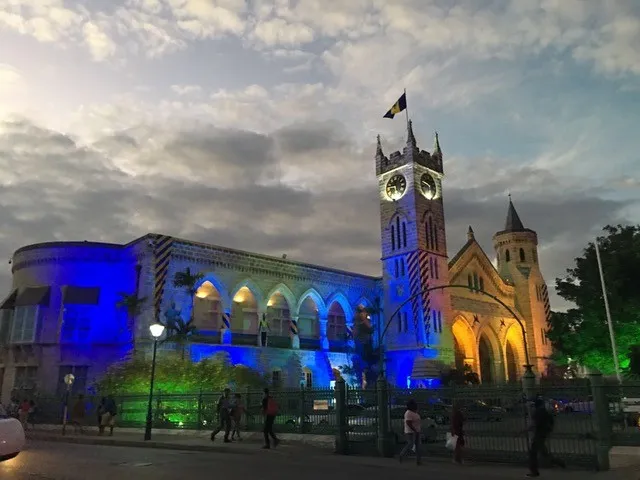
November 30 is when Barbados celebrates its peaceful accession to independence (1966). Fifty-five years on, the island – long seen as ‘Britain’s Caribbean Crown jewel’ – recently gave up being a constitutional monarchy to become a republic. It was a moment of great pride, mixed with some emotion; relinquishing the country’s ties with the British Crown amounts to cutting the umbilical cord with the Queen of England, whom people in Barbados have always respected as their Chief of State. And this is precisely what makes Barbadians uniquely British and African: the unalienable imprint British affiliation left on a population of African descent.
The island’s location, just east of Latin America, has misled many a first-time visitor – including yours truly – into naively expecting a stereotypical latinx ambiance. Do not be fooled: you're unlikely to find street performers outside Crop-Over,(1) nor will you be approached by exotic fruit vendors on the beach. No wonder: for over 350 years, Barbados was colonized by the British, and only by the British. Unlike all other Caribbean islands, which armadas from the main European powers took turns conquering over the centuries, the loyal troops that defended this military stronghold of the British Empire never gave way to other armed forces. How could I ever imagine that the culture in Barbados had a remotely latinx flavor? Once I’d set the record straight in my little head, I was able to better capture the spirit and paradox of these overwhelmingly African-descended nationals. For one thing, you’ll rarely see displays of exuberance in unfamiliar circumstances. Blame it on British restraint. Manners, etiquette, discipline, the strict school system, the attachment to school uniforms and parade costumes – all of it stems from a British heritage.
And it is a British heritage Barbadians staunchly adhere to. They take pride in their command of the Queen’s English, although among themselves, they’ll switch to the Bajan(2) dialect which qualifies as an acrolect, a linguistic classification the English in the Caribbean course(3) taught me; in other words, it ranks as the closest to standard English. The game that drives crowds crazy like no other is cricket. When I first toured Bridgetown, my mentors never failed to remind me that the Barbados Parliament was the third longest-running parliament within the Commonwealth.
The local cuisine is another reflection of British culture. The classic fish and chips has adapted to Barbadian tastebuds as catch of the day with a side serving of sweet potato fries (called chips); the common ancestry of macaroni pie and macaroni and cheese cannot be denied.
While rum is vastly preferred over beer, and although alcohol, unlike in the United Kingdom, can be consumed without any restriction, cannabis (known as ganja), derived from Caribbean and African traditions, is demonized. Could this be a remnant of the social dictates that prevailed for a long time among British sugar plantation owners and their guests? After all, isn’t the island nicknamed Little England, with town names strangely reminiscent of the motherland: Hastings, Kensington, Dover, Little Bristol, Brighton, Brandon… If you ever book a hotel online, beware: better make sure it is surrounded with palm trees rather than hidden in some dark London borough…
Ditto for names and surnames. Peter, Wayne, Diana or Liz are far more commonplace than African-sounding names. The same goes for an overwhelming number of patronyms. On the old plantations, African-born slaves were compelled to give up their own surnames and, as proof of proprietorship, take on their owner’s, with one significant difference: the letter “e” was often added to the slave’s new surname (as in Clarke, Forde…) so as to avoid any confusion with the masters’ families.
So what about Africa? Here’s the thing: Africa is alive and well in the very soul of Bajans. Or rather, it is the Bajan soul.
It is revealed in the leisurely way locals walk around on the island.
It radiates in the good-natured demeanor and spontaneity Bajans exhibit with people they trust;
It propagates with the infectious laughter of the local folks;
It transpires in the warmth of intergenerational relations and in the respect for the elderly;
It infuses social and even professional relations with humanity;
It jumps out of the colorful dwellings, flowers and fashion;
It is on offer at Cheapside’s fruit and vegetable stalls or Oistins’ fishmarket;
It reigns supreme over Bridgetown’s Swan Street, the capital’s swarming pedestrian artery where the hustle and bustle never stop;
It tickles your palate when eating spicy fishcakes sold on the side of a road, washed down with the milk of a fresh coconut that the vendor opens for you with his machete;
It deafens you with blaring music on street markets, minibuses or at parties;
It blooms in the colors, shapes and patterns of African artwork;
It is recognizable in the tams(4) worn by Rastas(5) to cover their long hair, and in the more sophisticated, elaborate braids worn by women and men alike;
It honors the memory of its ancestors through the devout practice of various African cults on Emancipation Day every August 1st;
It flaunts its total lack of body shame when dancers suggestively sway their hips for Wukkup(6);
It never misses a chance for partying or fêting at carnivals such as Crop-over or other national celebrations, with representations of traditional characters such as the voluptuous Mama Sally, who symbolizes fertility, or Shaggy Bear, the kind, hairy bear endowed with healing powers;
It resonates through the flutes and drums played by Tuk bands at celebrations, or during steel pan concerts.
This astonishing cultural cocktail was never as magnificently illustrated as on the day of the ceremony marking the proclamation of Barbados as a Republic, with great pomp and circumstance, amongst a delirious mix of protocol and folklore. It is a safe bet that even after parting ways with the Crown, Barbados will cleverly preserve the delicate balance which allows the kaleidoscope of African culture to burst through a veil of Britishness.
And wouldn’t you say the choice of singer Rihanna as plenipotentiary ambassador of Barbados, in the presence of Prince Charles, perfectly illustrates the way the former British colony, choosing assertion over submission, bade farewell to monarchy and became a republic?
1) Crop-over: 2-month celebrations marking the end of the sugar cane season.
2) Bajan (pr. bey-djun): noun or adjective, used for “Barbadian”.
3) English in the Caribbean**: a course in Caribbean English and Culture, organized in Barbados in 2019 et 2020. Find more
4) Tams: a head covering worn over dreadlocks.
5) Rasta: a follower of Rastafarianism, a social, cultural and spiritual movement initiated in Jamaica in the 1930s.
6) Wukk-up: sensual Caribbean type of dance.
Translated by Edna Setton
December 20, 2021
